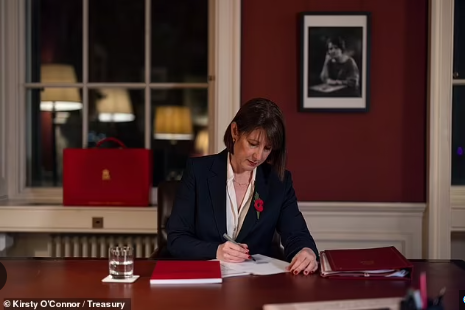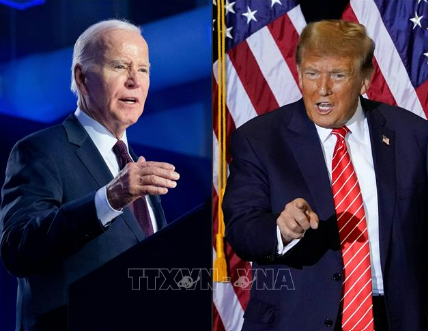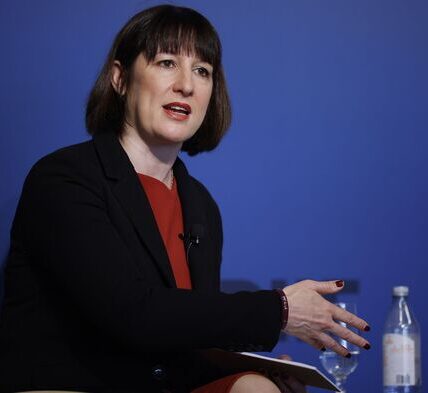It’s Red Rachel! Chancellor proudly poses for Budget prep pic in No11 alongside image of ex-Communist education minister from 1940s – after ditching photo of tax-cutting Tory Nigel Lawson_Nhy
Rachel Reeves has posed for Budget prep pictures alongside an image of a former Communist education minister from the 1940s.
The Treasury released a photo of the Chancellor in her No11 study, with a portrait of Ellen Wilkinson proudly displayed on the wall behind her.
Ms Reeves has put Wilkinson, who helped found the British Communist Party and met both Lenin and Trotsky, in the place previously occupied by Tory ex-chancellor Nigel Lawson.
The publicity picture was released as Keir Starmer insisted tomorrow’s Budget will ‘protect payslips’ despite fears a huge tax bomb will push Britain towards a Sweden-style burden.
Ms Reeves is expected to bring in a massive £35billion a year extra for the Treasury – one of the biggest ever raids at a fiscal event.
The centrepiece is set to be a major increase to employers’ national insurance – giving ministers a get-out that they are not directly hitting workers, even though experts say they will inevitably bear the pain.

Rachel Reeves has posed for Budget prep pictures alongside an image of a former Communist education minister from the 1940s

Ms Reeves has put Wilkinson, who helped found the British Communist Party and met both Lenin and Trotsky, in the place previously occupied by Tory ex-chancellor Nigel Lawson (photo shows Jeremy Hunt in No11 earlier this year)

Ellen Wilkinson with the writer GK Chesterton in 1931
Sir Keir has made clear there is little prospect of taxes coming down again, using a speech yesterday to dismiss the ‘fiction’ that governments can ‘lower taxes and that your public services will run properly’.
Wilkinson was a minister in Clement Attlee’s government. A biography about her was titled ‘Red Ellen: The Life of Ellen Wilkinson, Socialist, Feminist, Internationalist’.
It emerged over the summer that Ms Reeves had removed the photo of Lord Lawson, who was Chancellor under Margaret Thatcher between 1983 and 1989, with a trailblazing woman.
However, she said at the time that she had not decided who it would be.
When Rishi Sunak became Chancellor one of the first things he did was hang Lord Lawson’s portrait on the wall above his desk.
He started out as the MP for the Blaby constituency in Leicestershire in 1974.
He was in Mrs Thatcher’s cabinet from 1981 to 1989, with six years as her chancellor, before retiring as a backbench MP in 1992 and joining the Lords.
He retired from politics altogether in December, with his last major contribution coming as a prominent voice in the Vote Leave campaign ahead of the Brexit referendum.
Sir Keir opened a political Cabinet meeting this morning by saying that the government is ‘choosing to fix the NHS, rebuild Britain and protect the payslips of working people’, to deliver on our mandate for change.’
‘The Prime Minister highlighted the black hole in the public finances that the Conservatives covered up, which means that tough choices are necessary to stabilise the economy and rebuild our country,’ a Labour spokesman said.
‘He added that the question for the Budget is not whether we must act, it is how we act and what choices we make in the national interest.’
The Chancellor told ministers ‘there would have to be difficult decisions on spending, welfare and tax’ to deal with the legacy she inherited.
‘She said the Labour Party promised there would be no return to austerity and the Budget tomorrow would deliver on that promise. She said the choices the Government is taking will restore economic stability.
‘She said the Budget would fix the foundations of the economy and deliver on the promise of change.’
Critics have dismissed claims from ministers that ordinary ‘working people’ will not see the impact on payslips, because most of the pain will be initially targeted at businesses and the wealthier.
The Tories have accused Labour of not being ‘straight with the British people’ about their intentions before the election.
The scale of tax increases expected in the Budget could leave Ms Reeves with two unwanted slices of history.
Official figures suggest it would be the most tax raised at a Budget since 1993, in the aftermath of the Black Wednesday Sterling crisis.
And Ms Reeves could put the country on track to pay the highest tax as a proportion of GDP since comparable records began nearly eight decades ago.
The increase would be roughly equivalent to 1.2 per cent of GDP. Adding that to the existing forecasts for the tax burden suggests that it will be over the previous peak of 37.2 per cent in 1948.

Keir Starmer and Chancellor Rachel Reeves (pictured yesterday) told a Cabinet meeting that the much-anticipated package will ‘deliver change’

Labour could push Britain towards a Scandinavian-style tax burden when Rachel Reeves (pictured with health secretary Wes Streeting) presents a bumper Budget tomorrow
The IMF has estimated that Britain has already been seeing higher tax increases than other advanced nations.
On the OECD’s measure of tax, which is slightly lower than the ONS, the UK’s tax burden was 33.5 per cent of GDP in 2021. That put the country below the G7 average.
But an increase of £35bn on top of other hikes since 2021 is likely to take the level close to 38 per cent.
That would be in line with Spain, and closing on countries such as Sweden and Norway – where the ratios are s 42.6 per cent and 42.2 per cent respectively. It compares to just 26.5 per cent in the US.
France has traditionally been one of the most-taxed economies with 45.1 per cent of GDP going to the state.
A major increase to employers’ national insurance contributions looks set to be the centrepiece of the big post-election package.
There are also likely to be attacks on inheritance tax, capital gains and pension pots.
The Labour election manifesto used the term ‘working people’ as it laid out who would be protected from increases.
But Sir Keir sparked fury last week by suggesting landlords, shareholders and savers did not count.
Education Secretary Bridget Phillipson struggled yesterday on whether small business owners making just £13,000 a year were ‘working people’.
And the premier tried to avoid a definition entirely this morning, merely insisting ‘the working people of this country know exactly who they are’.
In his speech, Sir Keir said: ‘We have to be realistic about where we are as a country. This is not 1997, when the economy was decent but public services were on their knees.
‘And it’s not 2010, where public services were strong, but the public finances were weak. These are unprecedented circumstances.
‘And that’s before we even get to the long-term challenges ignored for 14 years: an economy riddled with weakness on productivity and investment, a state that needs urgent modernisation to face down the challenge of a volatile world.’
The PM denied he is using the UK’s problems as ‘an excuse’, despite repeatedly putting the blame on the Tories.
‘Politics is always a choice. It’s time to choose a clear path, and embrace the harsh light of fiscal reality so we can come together behind a credible, long-term plan,’ he said.
Challenged that most voters would prefer lower taxes rather than investment in public services, the PM said: ‘No. I think for too long, we pretended that you could lower tax and spend more on your public services, but you can’t. And it’s about time we faced up to that.’
He added: ‘Almost everybody knows the NHS is broken. We’re going to fix it, put it back on his feet, and make it something we can be proud of again.
‘That’s the path we’re choosing, and that’s what we’ll deliver for working people.
‘But what we’re not going to do is continue the fiction that got us here in the first place, the pretence that you can always have lower taxes and that your public services will run properly.
‘Because the last 14 years have shown this is completely and utterly untrue, and people voted for change.’

And Keir Starmer (pictured) has made clear there is little prospect of taxes coming down again
Sir Keir repeatedly sidestepped making a commitment not to raise taxes again over this Parliament.
‘I can’t give you a cast iron guarantee that never again in any budget will there be any adjustment to tax, because we just don’t know what’s around the corner. We’ve lived through, in the last five or six years, Ukraine, Covid, et cetera,’ he said.
‘But I can tell you that as we stand here now going into this budget, it’s our intention to take the tough decisions here and now up front, in the hope that we can then build and rebuild the country on that stable foundation.’


